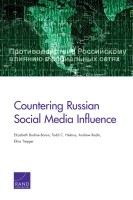Data is the new source of political power, Yuval Noah Harari tells NPR. He explains his worries that big data and AI technology threaten to destroy liberal democracy in a TED Talk (above).
Russian social media disinformation campaigns can be viewed as a “disinformation chain,” notes a new RAND report, winding from the Kremlin leadership, to other organs and proxies, through amplification channels such as social media platforms, and finally to consumers. This stylized model of a complex dynamic process is useful for categorizing and analyzing potential approaches for countering the threat.
Key Findings
- Experts agree that current efforts to combat Russian social media influence are fragmented and incomplete.
- Solutions are independently proposed (and sometimes implemented) by different stakeholders, but rarely are such stakeholders aware of what others are doing, to say nothing of paths of cooperation.
 Efforts to increase cooperation and information-sharing are nascent and lack the necessary resources and authorities to make much of a difference.
Efforts to increase cooperation and information-sharing are nascent and lack the necessary resources and authorities to make much of a difference.- As it currently stands, there does not appear to be a strategy that delineates tasks and responsibilities for an organized response to Russian disinformation operations in the United States.
- Experts also agree that while there is no one single solution to countering Russian social media influence, stronger cooperation between the government and the private sector is clearly needed.
- Without cooperation and coordination, efforts will remain piecemeal and inadequate, and the United States will remain vulnerable to influence campaigns by Russia and other adversaries.
There is no silver bullet, the authors note. Instead, they recommend several approaches that target different links in the Kremlin’s “disinformation chain”:
- Establish clear and enforceable norms for acceptable behavior for states’ and media entities’ behavior on social media platforms.
- Coordinate U.S. executive and legislative branch activities.
- Institute a formal mechanism for information-sharing that includes key players from the U.S. government and private social media companies.
- Increase the transparency of social media platform policies and algorithms for detecting and removing disinformation and malicious behavior.
- Encourage and fund academia to develop better tools for identifying and attributing disinformation on social media.
- Prioritize defensive activities over punishments to shape Moscow’s decision-making.
- Continuously assess the cost and impact of proposed solutions relative to the effectiveness of Russia’s activities. RTWT
The National Endowment for Democracy’s International Forum asks five leading experts: How will “Deepfakes” and Emerging Technology Transform Disinformation? Amy Studdart outlines how democracies can better protect themselves from authoritarian election meddling in “Cybersecurity for Political Campaigns in the Digital Age” in the Forum’s Power 3.0 blog.







